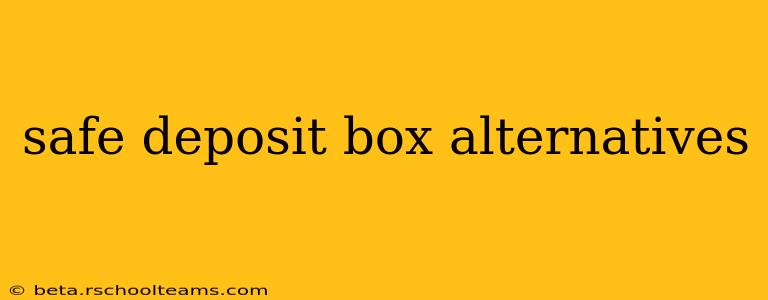Safe deposit boxes offer a secure place to store important documents and valuables, but they aren't the only option, and they certainly aren't always the best option. Cost, accessibility, and limitations can make alternative storage solutions more appealing. This guide explores several safe deposit box alternatives, weighing their pros and cons to help you choose the best fit for your needs.
Why Consider Alternatives to a Safe Deposit Box?
Before diving into the alternatives, let's briefly outline why you might seek them out:
- Cost: Safe deposit box rentals can be surprisingly expensive, particularly for larger boxes. The annual fees can add up quickly.
- Accessibility: Access is typically limited to banking hours, potentially inconvenient if you need access outside those times.
- Location: You're tied to the location of your bank's safe deposit boxes.
- Security Concerns: While generally secure, banks can face unforeseen circumstances like robberies or natural disasters.
- Limited Space: The size limitations of safe deposit boxes can restrict the amount of items you can store.
Top Safe Deposit Box Alternatives:
Here are several viable alternatives to consider, each catering to different needs and budgets:
1. Home Safe:
A home safe is a popular choice for storing valuable items at home. They come in various sizes and security levels, ranging from basic fireproof safes to high-security models with advanced locking mechanisms.
Pros: Convenient access, readily available in various sizes and price points.
Cons: Vulnerable to home burglaries, potential for fire damage depending on the safe's fire resistance rating. Requires space within your home.
2. Safety Deposit Box at a Different Location:
Not all safe deposit boxes are created equal. You might consider a credit union or a different bank that offers more competitive pricing or more convenient hours.
Pros: Might offer better rates or accessibility compared to your current bank.
Cons: Still subject to banking hours and location limitations; doesn't address underlying concerns about banking security.
3. Home Security System with a Safe:
Integrating a home safe with a comprehensive home security system provides an added layer of protection. The security system can alert you to any unauthorized access attempts, deterring potential thieves.
Pros: Enhanced security compared to a standalone safe.
Cons: Higher upfront and ongoing costs due to the security system monitoring fees.
4. Offsite Storage Facility with Security Features:
For bulkier items or large collections, an offsite storage facility with robust security features, such as 24/7 surveillance and controlled access, might be a suitable option. Ensure the facility has insurance to cover loss or damage.
Pros: Ideal for larger items, potentially more affordable than a safe deposit box for significant storage needs.
Cons: Inconvenience of accessing items, costs can vary depending on space needed, and there's still a reliance on the security measures provided by the facility.
5. Digital Security for Documents:
For valuable documents, consider digitalization and secure cloud storage. Scanning important papers and storing them on encrypted cloud services offers accessibility and redundancy, though you'll need to ensure the platform has robust security protocols.
Pros: Accessibility from anywhere with an internet connection, easily shareable, cost-effective for large volumes of documents.
Cons: Vulnerable to hacking if security isn't properly maintained, and requires technological proficiency.
6. Trust and Estate Planning:
For truly irreplaceable items, consider incorporating them into your estate planning. This involves designating a trustee or beneficiary to manage and safeguard the assets after your passing.
Pros: Ensures the secure transfer of valuable items according to your wishes.
Cons: Requires legal assistance, not a solution for immediate access or safekeeping.
Choosing the Right Alternative:
The best alternative to a safe deposit box depends on your specific circumstances:
- Value and volume of items: High-value, small items might be suitable for a home safe, while large collections might require offsite storage.
- Budget: Costs vary greatly across options, from inexpensive home safes to more costly security systems and storage facilities.
- Accessibility needs: Consider how frequently you'll need access to your items.
- Security priorities: Assess your risk tolerance and choose an option with appropriate security features.
By carefully considering these factors and exploring the options presented, you can find a secure and cost-effective alternative to a traditional safe deposit box. Remember to always prioritize security and convenience when making your decision.
